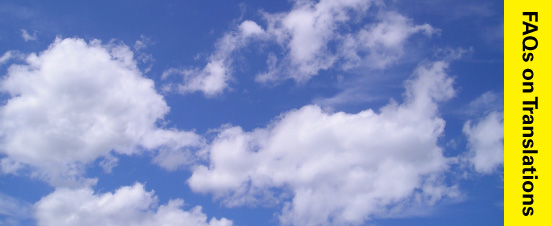Frequently Asked Questions on Translation
How much will it cost?
The costs involved in translating a document are dependent upon several factors, such as the length of the document, language and turnaround time. Additionally, desktop publishing, graphic work, and technical and handwritten documents may increase the overall cost of a translation project.
Why are translations so expensive?
In order to ensure that each translation we do is as error-free as possible, we only work with professional translators and proofreaders. These translators have the specialized skills and knowledge needed to render a quality translation and they are appropriately paid professional rates. Additionally, translated documents need to be edited and reviewed by a second translator of equal or greater competence to ensure that the original translation is a faithful and accurate rendering of the source language. Using unskilled bilingual people will certainly lower the price of the translation, but it will also greatly reduce the quality of the translation.
Why does company X charge so much less than you?
There are many factors which determine how a company prices its services, so it is not possible to say why a given company might charge more or less. However, if a company is providing “dirt cheap” translations, you should be cautious. Often such companies are not providing any quality control and are not having the translations proofed or edited. If they were, then they would be unable to offer such low rates. Below a certain price it is simply not possible to provide quality work. You usually get what you pay for. If the image of your business is at stake, it pays to find out all you can before you go with the lowest bid.
How do I know if the translation is any good?
Indy Translations works with only experienced translators who have a proven track record of successful work with us. Then the translation is sent to a second translator for proofreading and editing. By following these steps, and often seeking professional advice on technical and legal translations, we strive to ensure that our client will never be embarrassed by errors in any translation that we provide.
How long does a translation take?
Turnaround time varies with each project. Our normal turnaround time for non-technical documents is three days for the first 2,000 words and one additional day for each additional 1,500 words. This enables us sufficient time for proofreading and editing and those inevitable unexpected problems.
Do you do rush work?
Yes. We do rush work on a regular basis. It seems that translation of materials is often left until the last minute. However, if a project is simply too big or specialized to complete in a given period, we will turn it down. For example, a 20,000-word legal contract into Japanese needed for tomorrow morning would be rejected. There would simply be no way to have any quality control over such a project. Dividing it between six or eight translators and “putting it together” the next day would yield a stylistically and lexically terrible document that would satisfy no one. It would take at least a full second day to proofread and edit such a document, assuming the original translations were well done.
What languages do you translate?
Indy Translations works with translators in all major world languages. We have worked in 0ver 100 languages so far. We can usually provide translations in exotic languages if there is no rush associated with the project.
Do you use machine translation?
Indy Translations does not use machine translation. Machine translation is only able to provide a word for word substitution of a given text without applying logic or context. More recent machine translation technology is blending computer-generated translation with human translation from thousands of sources along with glossaries, but at best it can only give web surfers “rough” gist of a foreign website. However, we do use computer-aided translation tools. These tools memorize and store translated text for future re-use and allow for greater consistency throughout documents.
Do you handle all the translations at your office?
No. Like all full-service translation agencies, we depend on professional translators throughout the world to provide us with specialized knowledge in a given language pair. It would simply be impossible to have translators available on staff in the dozens of languages we serve. However, we do have in-house translators in Spanish, French, Portuguese, Italian, Chinese and Russian. We also rely on independent translators in these languages who specialize in areas which our in-house translators do not.
What is the difference between a translator and an interpreter?
Translators deal with the written word and interpreters deal with the spoken word.
Are your translations certified?
In the United States there are currently no regulations regarding translation work. Various organizations provide certificates and accreditations to translators, but that does not mean that their translation is “certified.” However, we can provide a notarized statement which attests that our translation has been reviewed by professional translators and found to be accurate and complete.
Do you do video subtitling or dubbing?
Yes. We have successfully handled many projects in both areas. We have established relationships with audio and video studios that ensure that your video projects will come out flawlessly. We can even screen your voice talent or find it for you.
Are your services completely confidential?
Definitely! The only people involved in your project will be the language professionals directly working on the translation, proofreading or editing. Clients routinely ask that we sign Confidentiality and Non-Disclosure documents with them and we do likewise with our translators.


